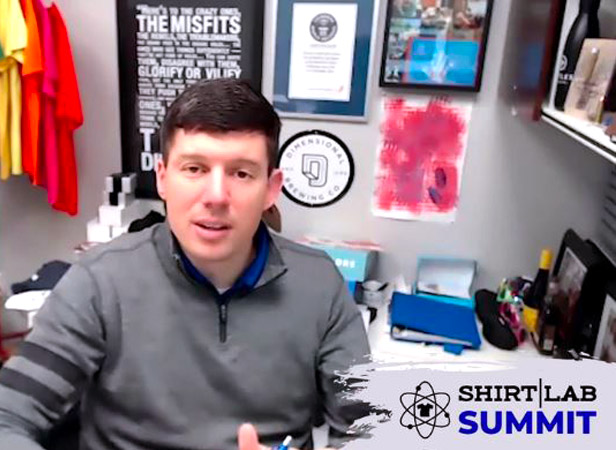Product Hub March 22, 2021
Experts Share Business Tips at Shirt Lab Summit
The virtual event featured more than 30 speakers, many of them leaders in the promotional products and apparel decoration world.
Shirt Lab Summit, a virtual event held on March 19 and 20, featured more than 30 experts sharing everything from the secrets of successful online stores to how to emerge from the pandemic stronger than before. Shirt Lab was created in 2018 by business consultant Marshall Atkinson and Tom Rauen, CEO of Envision Tees (asi/556030), to help decorated-apparel companies develop better sales and marketing techniques. Since its conception, Shirt Lab has hosted more than half a dozen live and virtual events for decorated-apparel and promotional products professionals.
Shirt Lab Summit is the first of three events scheduled for 2021. A virtual “Women’s Nexus” show is planned for June 5, and a live show is planned for Ft. Worth, TX, in September. Here are some highlights from the virtual Shirt Lab Summit event.
How to Differentiate Your Business

Author and business expert Mike Michalowicz was the keynote speaker at the virtual Shirt Lab Summit.
Mike Michalowicz has made it his mission to end what he called “entrepreneurial poverty,” whether that’s in the form of strained finances or a dearth of free time. Michalowicz is the owner of multimillion-dollar venture Profit First Professionals and author of several business books including Fix This Next and The Pumpkin Plan. So many entrepreneurs “go into business because it’s their dream, but it becomes their nightmare,” he said.
During his keynote session, Michalowicz explained how to reclaim your time, differentiate your business from the competition and more. For instance, Michalowicz discussed the concept of taking a four-week vacation from the business as a way of strengthening it. “If the business depends on you, you’re actually crippling the asset,” he said. Entrepreneurs should figure out how to systemize the business so it can run smoothly even when they’re not physically present, he added.
Another key point Michalowicz made was the importance of differentiation in marketing. Too many small businesses rely on word of mouth to generate leads and build a customer base. “That’s icing on the cake, but it surely isn’t the cake,” he said. Instead, Michalowicz advised business owners to create a marketing system that can be throttled up and down, depending on need. When creating a marketing plan, it’s vital to point out what makes your company different from the competition.
“Whatever the common approach is in your industry, break that because it becomes noticeable,” he said. “Do something that no one else is doing that triggers excitement.”
One example he gave was a leadership trainer who sent out a box of thank-you cards along with a script that business owners could fill them in with whenever an employee did something worth recognizing. He advised the leader to try this for a week, see how well it worked, then give him a call if it was successful. “It was really powerful,” Michalowicz said. Each self-promo box cost about $50 to send out, but resulted in at least one $70,000 consulting gig for the trainer.
Another differentiator is how you describe the services you provide. Michalowicz advised promotional products distributors and apparel decorators to reposition themselves as, perhaps, a “brand consultant” or “brand positioning adviser,” rather than using the label of the industry. Focusing on your expertise and consulting skills will help you avoid competing on price alone.
“Leverage your uniqueness and brand yourself around that,” he said. “Allow the perceived commodity stuff just to be perfunctory, but don’t make that be your lead differentiator.”
How to Level Up Your Business

LaTonna Roberson, also known as Lady Print Boss, talked about how small shops can position themselves for growth.
LaTonna Roberson started a T-shirt shop in 2000 with only a heat press. Since then, she’s grown the business into a fully automatic shop and prints for major brands and corporations. Known as the Lady Print Boss on YouTube and elsewhere, she also works as a freelance coach and technical trainer for startups and small shops, teaching them how to “think big, grow bigger and boss up.”
During her session, Roberson shared some simple ways for smaller decorating shops to succeed, including writing down a short list of goals each month, keeping a calendar of events your clients and prospects have planned, and optimizing your website. “You may be small, but make yourself look big,” she advised.
It’s also vital to advertise your business and talk up your services wherever you go. “If I’m at a restaurant and I see the workers wearing shabby shirts, I’ll ask to speak to the owner,” Roberson said. “I’ve always got something in a bag I can pull out. I can’t tell you how many times I’ve gotten people by just opening my mouth and talking and not being afraid to do it.”
It’s all about being persistent and systematic in your growth, and having a positive attitude. Roberson recalled her first big order: 10,000 T-shirts for a Texas car dealership. She completed it without having a belt dryer, instead using a flash unit to cure each screen-printed shirt and remembered thinking, “I can’t do this again.” But she was able to leverage each order to help purchase new and bigger equipment, never having to lease items and growing her shop and business one rung at a time. “You’re just bossing all the way up the ladder until you get where you’re at,” she said.
How to Build a Better Online Store

Tom Rauen, founder and CEO of Envision Tees, is one of the founders of Shirt Lab. He spoke about how to improve online stores.
Rauen, founder and CEO of Envision Tees and 1-800-TSHIRTS, encouraged distributors and decorators to broaden their thinking when it comes to online and company stores. At any given time, Rauen’s shop has several hundred online stores, whether for corporate clients, sports teams, booster clubs, 5K races or family reunions.
“Make sure you’re looking at all the possibilities for opening an online store,” he said during his Shirt Lab Summit session. For instance, some corporate clients have an online store, even though only one person in the marketing department accesses it for internal orders. The online setup still makes it easier for both the client and Envision Tees to process and fulfill orders, Rauen said. “They’re picking out the product and adding sizes and colors, then they’re paying for it without us having to enter in all the information,” he explained.
When it comes to building and stocking online stores, simple is better. Use the same template to build each store to save time, and limit the amount of items and styles available so that you don’t cause “analysis paralysis” for your shoppers. It’s also a good idea to limit the number of suppliers used in the stores to cut down on shipping fees and associated headaches.
Think of an online store like a brick-and-mortar shop, Rauen said. Mall stores are constantly updating the goods displayed in their windows to keep it fresh and entice new customers. Online stores also need to change with the seasons, with lighter-weight apparel in the warm months and cold-weather gear released ahead of winter.
Keep an eye on holidays – from the well-known to the more obscure – to take your online store offerings to the next level. Break out ugly holiday sweater designs ahead of the Christmas season, create patriotic versions of a logo for Fourth of July, drop a line of pastel apparel in advance of Easter. Follow a “swag drop” model for these limited-edition items, and “create that scarcity” by making them available to order for a one- or two-week period, Rauen said.
“If you watch other fashion brands and what they’re doing, think of your online store like that,” Rauen said.

Product Hub
Find the latest in quality products, must-know trends and fresh ideas for upcoming end-buyer campaigns.
